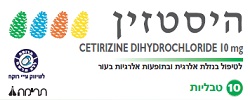Quest for the right Drug

היסטזין HISTAZINE (CETIRIZINE DIHYDROCHLORIDE)
תרופה במרשם
תרופה בסל
נרקוטיקה
ציטוטוקסיקה
צורת מתן:
פומי : PER OS
צורת מינון:
טבליה : TABLETS
עלון לרופא
מינוניםPosology התוויות
Indications תופעות לוואי
Adverse reactions התוויות נגד
Contraindications אינטראקציות
Interactions מינון יתר
Overdose הריון/הנקה
Pregnancy & Lactation אוכלוסיות מיוחדות
Special populations תכונות פרמקולוגיות
Pharmacological properties מידע רוקחי
Pharmaceutical particulars אזהרת שימוש
Special Warning עלון לרופא
Physicians Leaflet
Adverse reactions : תופעות לוואי
4.8 Undesirable effects Clinical studies • Overview Clinical studies have shown that cetirizine at the recommended dosage has minor undesirable effects on the CNS, including somnolence, fatigue, dizziness and headache. In some cases, paradoxical CNS stimulation has been reported. Although cetirizine is a selective antagonist of peripheral H1-receptors and is relatively free of anticholinergic activity, isolated cases of micturition difficulty, eye accommodation disorders and dry mouth have been reported. Instances of abnormal hepatic function with elevated hepatic enzymes accompanied by elevated bilirubin have been reported. Mostly this resolves upon discontinuation of the treatment with cetirizine dihydrochloride. • Listing of ADRs Double blind controlled clinical trials comparing cetirizine to placebo or other antihistamines at the recommended dosage (10 mg daily for cetirizine), of which quantified safety data are available, included more than 3200 subjects exposed to cetirizine. From this pooling, the following adverse reactions were reported for cetirizine 10 mg in the placebo- controlled trials at rates of 1.0 % or greater: Adverse reactions Cetirizine 10 mg Placebo (WHO-ART) (n= 3260) (n = 3061) General disorders and administration site conditions Fatigue 1.63 % 0.95 % Nervous system disorders Dizziness 1.10 % 0.98 % Headache 7.42 % 8.07 % Gastro-intestinal disorders Abdominal pain 0.98 % 1.08 % Dry mouth 2.09 % 0.82 % Nausea 1.07 % 1.14 % Psychiatric disorders Somnolence 9.63 % 5.00 % Respiratory thoracic and mediastinal disorders Pharyngitis 1.29 % 1.34 % Although statistically more common than under placebo, somnolence was mild to moderate in the majority of cases. Objective tests as demonstrated by other studies have demonstrated that usual daily activities are unaffected at the recommended daily dose in healthy young volunteers. Paediatric population Adverse reactions at rates of 1 % or greater in children aged from 6 months to 12 years, included in placebo-controlled clinical trials are: Adverse reactions Cetirizine Placebo (WHO-ART) (n=1656) (n =1294) Gastro-intestinal disorders Diarrhoea 1.0 % 0.6 % Psychiatric disorders Somnolence 1.8 % 1. 4 % Respiratory thoracic and mediastinaldisorders Rhinitis 1.4 % 1.1 % General disorders and administration site conditions Fatigue 1.0 % 0.3 % Post-marketing experience In addition to the adverse reactions reported during clinical studies and listed above, the following undesirable effects have been reported in post-marketing experience. Undesirable effects are described according to MedDRA System Organ Class and by estimated frequency based on post-marketing experience. Frequencies are defined as follows: Very common (≥1/10); common (≥1/100 to <1/10); uncommon (≥1/1,000 to <1/100); rare (≥1/10,000 to <1/1,000); very rare (<1/10,000), not known (cannot be estimated from the available data) • Blood and lymphatic disorders: Very rare: thrombocytopenia • Immune system disorders: Rare: hypersensitivity Very rare: anaphylactic shock • Metabolism and nutrition disorders: Not known: increased appetite • Psychiatric disorders: Uncommon: agitation Rare: aggression, confusion, depression, hallucination, insomnia Very rare: tics Not known: suicidal ideation, nightmare • Nervous system disorders: Uncommon: paraesthesia Rare: convulsions Very rare: dysgeusia, syncope, tremor, dystonia, dyskinesia Not known: amnesia, memory impairment • Eye disorders: Very rare: accommodation disorder, blurred vision, oculogyration • Ear and labyrinth disorders: Not known: vertigo • Cardiac disorders: Rare: tachycardia • Gastro-intestinal disorders: Uncommon: diarrhoea • Hepatobiliary disorders: Rare: hepatic function abnormal (increased transaminases, alkaline phosphatase, γ-GT and bilirubin) Not known: hepatitis • Skin and subcutaneous tissue disorders: Uncommon: pruritus, rash Rare: urticaria Very rare: angioneurotic oedema, fixed drug eruption Not known: acute generalized exanthematous pustulosis • Musculoskeletal and connective tissue disorders Not known: arthralgia • Renal and urinary disorders Very rare: dysuria, enuresis Not known: urinary retention • General disorders and administration site conditions: Uncommon: asthenia, malaise Rare: oedema • Investigations: Rare: weight increased Description of selected adverse reactions After discontinuation of cetirizine, pruritus (intense itching) and/or urticaria have been reported. Reporting of suspected adverse reactions Reporting suspected adverse reactions after authorisation of the medicinal product is important. It allows continued monitoring of the benefit/risk balance of the medicinal product. Any suspected adverse events should be reported to the Ministry of Health according to the National Regulation by using an online form: https://sideeffects.health.gov.il Side effects can also be reported to the following email: safety@trima.co.il

מסגרת הכללה בסל
התוויות הכלולות במסגרת הסל
| התוויה | תאריך הכללה | תחום קליני | Class Effect | מצב מחלה |
|---|---|---|---|---|
| MIZOLASTINE | ||||
| CETIRIZINE | ||||
| EBASTINE | ||||
| FEXOFENADINE | ||||
| LEVOCABASTINE | ||||
| LORATADINE | ||||
| MIZOLASTINE |
שימוש לפי פנקס קופ''ח כללית 1994
לא צוין
תאריך הכללה מקורי בסל
01/01/2000
הגבלות
תרופה מוגבלת לרישום ע'י רופא מומחה או הגבלה אחרת
רישום
104 99 28579 00
מחיר
0 ₪
מידע נוסף
